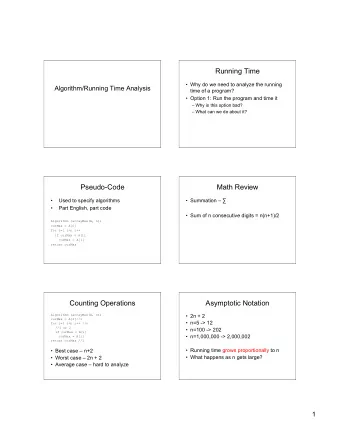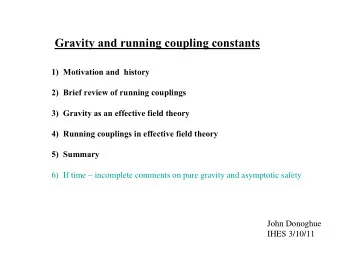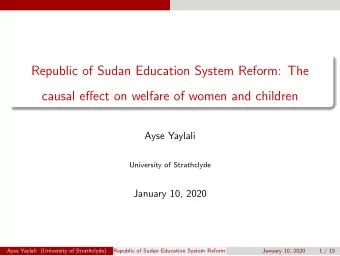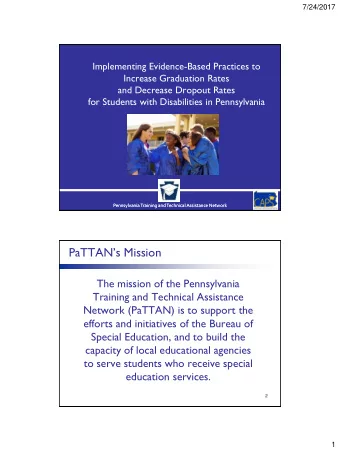
1 Case Presentation Running head: CASE PRESENTATION Alicia: A Case - PDF document
1 Case Presentation Running head: CASE PRESENTATION Alicia: A Case Presentation Christine S. CNSS 561 Holy Family University 2 Alicia: A Case Presentation Who is involved? In addition to the student client, Alicia, there are several others
1 Case Presentation Running head: CASE PRESENTATION Alicia: A Case Presentation Christine S. CNSS 561 Holy Family University
2 Alicia: A Case Presentation Who is involved? In addition to the student client, Alicia, there are several others who are involved in her case. At school, those who are involved include: me, her counselor (my supervisor), and the teachers on her grade level team. Although I have taken on primary responsibility for this case, my limited presence at Shafer Middle School necessitates my supervisor’s continued involvement in the case either as a consultant or simply someone to take phone messages. Alicia’s teachers are involved both as consultants, but also as individuals who take on a significant amount of responsibility for implementing recommended interventions. At home, both Alicia’s mother and her older sister have played a role in creating some of Alicia’s concerns, but also can be critical to bringing about positive change. Alicia’s mother functions primarily as a consultant and a source of encouragement for Alicia. Her sister, on the other hand, as a teacher, can be utilized as an additional source of support as well as a functional resource. What is the problem? Alicia is a quiet and sweet thirteen year-old African American girl. Despite average academic performance in the past and being considered by many as bright, Alicia has been struggling academically since the beginning of the school year. Initially she was able to maintain a C average, but as the school year progressed into the second and third marking periods, concerns were raised about declining grades, an apathetic attitude, disorganization, and procrastination. At the team meeting in late January when I first was introduced to Alicia’s case, Alicia’s teachers described her as a quiet student who avoids classwork and frequently employs excuses in order to explain incomplete and missing homework assignments. Her grades on tests can also be very unpredictable. On one test she may get a 98 percent, but on the next test she could get as low as a 53 percent. Alicia loves to read and has excelled in classes that offer the opportunity for independent study. She was even
3 Case Presentation placed in a reading section that was designed for gifted students. Despite her love of reading, however, Alicia’s worst subject is English. She also does poorly in science. Her grades are only marginally better in social studies and math. Alicia describes the classes in which she performs poorly as boring, particularly when they involve repetitive tasks like worksheets or writing rough drafts. This could mean one of two things: Alicia is capable of better work but is unmotivated due to boredom and instruction that does not match her preferred learning style or Alicia is lacking skills that lead her to adopt an attitude of indifference. Thus, as a result of consulting with Alicia’s team teachers, reviewing Alicia’s past academic record, and speaking with her several times, it is my opinion that Alicia’s primary presenting problem is academic underachievement due to a lack of motivation and self-confidence. In addition to these academic concerns and a potential contributor to Alicia’s low self- confidence, is Alicia’s shy demeanor. Having observed her in classroom settings, in the hallway, and in the lunchroom, Alicia keeps to herself and interacts with only a small group of friends. In my conversations with her, she sometimes has difficulty making eye contact and seems to be somewhat self-conscious. Yet, I have found that once she is comfortable, Alicia is actually very charming and cooperative. Still she often speaks of the anxiety she feels when she perceives others as judging her whether it is her peers or her teachers. Moreover, recent conversations have led me to believe that immaturity may be a factor in Alicia’s academic underachievement. Specifically, Alicia may view failing eighth grade as a means of avoiding moving to the high school next year, which is something I believe she fears. In conclusion, Alicia’s shyness, self-consciousness, and immaturity often manifest in avoidance, which prevents her from living up to her potential. Some of Alicia’s concerns may be attributable to her home life. Alicia is close to both her mother and older sister who care about her and are interested in seeing her do well in school. Alicia’s older sister is a teacher and is always pressuring her younger sister to do better in school. In fact,
4 despite having a close relationship with her sister, Alicia seems to feel as though she is often in her shadow. In terms of her mother, Alicia has a good relationship with her mom even though they often do not have a lot of time to spend together. Mom tends to say all the right things in phone conversations, but fails to follow through on recommendations made by myself as well as Alicia’s teachers. Alicia’s mother has also failed to show up at two scheduled parent-teacher conferences. Alicia’s mother seems to be responding in this way due to a combination of stress and a lack of time. As a result of her mother’s lack of engagement with the school, it is possible that Alicia may not be receiving the emotional support and encouragement she needs to improve. Several interventions have already been applied to Alicia’s case. In addition to parent-teacher consultation, a behavior plan is in place as well as regular individual counseling sessions with me. Alicia’s teachers keep a daily log that keeps track of classwork completion, classroom behavior, homework completion, use of her assignment book, and a list of missing assignments. In our weekly sessions, Alicia and I would view this behavior chart. We discuss what worked and what else could be tried. I also work with her on setting goals, organization, and we often talk about social and emotional issues as well. Although some progress has been made as a result of these interventions, Alicia continues to hand in homework assignments and has failed several quizzes and tests. Based on all available information, including the results of existing interventions, it is possible to gain a clearer understanding of the problem in this case. Accordingly, the primary presenting problem in Alicia’s case is academic underachievement. Her continued poor grades and irresponsible behavior appear to stem from a lack of motivation as well as feelings of inadequacy. Why am I involved? I became involved with Alicia’s case at the start of the second month of my internship at Shafer Middle School. Having attended a team meeting in which Alicia was discussed, I volunteered to take her on as part of my caseload. My first official act in this role was to meet with Alicia
5 Case Presentation individually in order to establish rapport and to get her point of view of the problems her teachers presented during the team meeting. I also worked with Alicia on developing some basic study skills, including helping her clean out her locker. From this first meeting, I have worked with my supervisor and the team to develop and monitor a behavior plan. This plan is easily accessible on Google Docs, which allows teachers to update the chart quickly and without worrying that the student will lose it in transit. My current work with Alicia includes monitoring this plan, weekly individual counseling sessions, regular consultation with her teachers, and periodic communication with her mother. The ultimate goal of these interventions is to provide Alicia with the support and structure she needs to improve academically. How do you conceptualize this case? Identifying data . Alicia is a thirteen year-old African American female who lives with her biological mother. Alicia also has an older sister who works as a teacher who does not live with the family, but she does visit often and plays a significant role in Alicia’s life. Alicia’s maintains regular contact and visitation with her biological father, stepmother, and two stepsiblings. Alicia comes from a lower middle class family. She dresses casually and can often be seen wearing jeans and a hoodie. Physically, she is normal in terms of body weight and is approximately 5’3” tall. Alicia is introverted and thus is not very expressive. However, once she gets to know someone, she is less self-conscious and is able to open up more. She can be incredibly sweet and has a good sense of humor. Alicia is currently not on any medications. Presenting Problem . Alicia is failing or close to failing many of her academic classes. Her academic underachievement is the result of a lack of motivation, low self-confidence, and the goal to avoid failure. These underlying concerns manifest in poor class participation, inadequate homework completion, and inconsistent test grades. Although behavior is not a problem, teachers have indicated that Alicia often requires a lot of prompting to complete activities and worksheets in
Recommend
More recommend
Explore More Topics
Stay informed with curated content and fresh updates.























